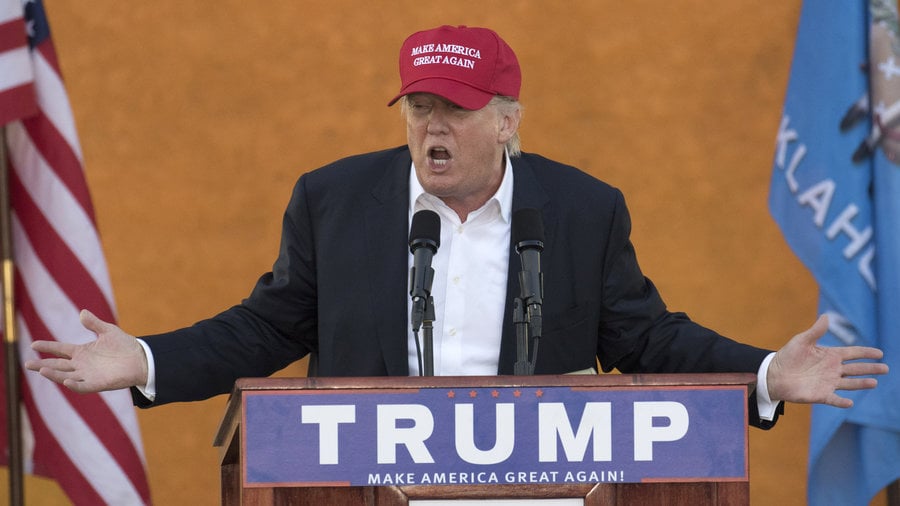The world first heard of Donald J. Trump in 1973, when the New York Times ran a frontpage story detailing a Justice Department lawsuit about how he and his father had conducted a Jim Crow-style policy across their apartment empire. So Trump in a way was coming full circle when he appeared in a Manhattan courtroom this week, again accused of shady business practices. Trump’s indictment, arrest and arraignment has created a political firestorm as the criminal-legal system enters the unchartered territory of trying a former president.
The charges from the Manhattan DA are just one of several legal problems facing the 45th president linked to his business practices and attempt to steal the 2020 election. Since Trump remains the front-runner in the Republican primary, the implications of these prosecutions on the 2024 election are already significant. Liberals are, of course, jubilant — gleeful at anything that even appears to take Trump down a peg. Millions of people across the country who hate Trump’s bigoted, hyper-capitalist politics also took something of a victory lap seeing Trump turn himself in.
The various cases against Trump are indeed “political,” but this is only a revelation for those naive enough to think prosecutors and the criminal justice system have ever been apolitical. Every day, prosecutors make a range of decisions for political reasons, mainly to look “tough on crime.” Trump supporters are now saying what many have known for some time — that the legal system is arbitrary, capricious and often unfair. This is the exact behavior these same people seek from the criminal-legal system when its targets are working class Black, Latino and Indigenous people who are the victims of the “law and order” politics they love. It’s also somewhat rich for Trump supporters to cry about “persecution” when Trump, as President, was an avid advocate and practitioner of political prosecutions against those he deemed enemies, often urging his officials to pursue blatantly illegal actions.
The Manhattan case also reflects the vacuous liberal elite “opposition” to Trump that focuses on the least consequential matters. This is a strategy that reflects the desire of the “Democratic” section of the ruling class to fold a section of Republican Party voters into their electoral coalition without changing their views on any substantive issues. The hoopla over District Attorney Bragg’s indictment has also obscured the much more consequential legal inquiries into Trump’s attempt to steal the 2020 election.
Ultimately, Trump’s legal trouble in New York and elsewhere is a reflection of the ongoing tussle among the ruling elites over how to right the sinking ship of U.S. capitalism.
Are they out to get him?
While “persecution” is a stretch, clearly Trump’s legal problems are wrapped up in his political struggles. Trump’s enemies in the political elite hate him not so much because of his policies, but because the way he pursues them threatens the social cohesion of the country.
The plutocrat-dominated two-party system is manifestly failing to deliver sustained social gains for any subset of society. It is precariously balanced around two increasingly bankrupt “conservative” and “liberal” ideologies which utilize a massive propaganda ecosystem to argue that the American system is fundamentally sound, and that any problems are only the result of the “other side.” Under this framework, instead of seeking fundamental change to society, all that is necessary to do is switch the party in power. But especially since the Bush administration, faith in the underlying strength and legitimacy of the existing political order has been eroding as it fails to address the pressing problems facing different sectors of the population.
Trump is a symptom of this decay. In many particulars, Trump’s program comports well with broad currents among the ruling elite. The economic core of his program includes eviscerating tax obligations for massive corporations and the ultra-wealthy; the crushing of unions and elimination of health, safety and wage regulations for workers; and totally ignoring climate change so that saving the planet does not stand in the way of profits. These were all core elements of the Republican Party program prior to Trump. Republicans have always built a coalition in support of these unpopular policies by linking them to opposition to the civil and human rights of Black people, women, the LGBTQ community and increasingly immigrants of all types.
Trump, however, took this to extremes. He operated with a very openly racist public presentation that jettisoned the decades of work Republicans had done to make their racist policies appear simply “race-neutral.” Even more, Trump rhetorically promoted a pre-WWII style imperialism, harkening back to the more “isolationist” Open Door Policy where American military and economic coercion was used more narrowly to “open” or keep open markets around the world — but with fewer pretensions to shape the world order ideologically. These things taken as a whole were disruptive to the precarious balance of the political system.
By laying bare many of the starkest contradictions and seeking to resolve them in a semi-fascistic manner, Trump opened up real space for the emergence of resistance to the current order. By questioning the imperialist consensus, he further opened up space for internal challenges to the unipolar world order beloved by the U.S. ruling class who created it. So, Trump is in no way a threat to capitalism or the ultra-rich in general, but he is uniquely disruptive to their mode of governance. As a result, Trump, while assembling a pirate-ship style collection of ruling class figures around him, has become a significant target for a wide subset of the ruling elite.
From “Russiagate” to the Manhattan indictment and the Justice Department probe into Trump keeping some documents in his mansion, forces led by the Democratic Party high command have sought to consolidate the elite opposition to Trump and to isolate his wing of the Republican party electorally. These Democratic Party forces are calculating that they can rely on Trump’s anti-worker program to keep their base in the labor unions and nationally oppressed communities onside. And at the same time, the Democrats’ leadership hope to use their total support for imperialist adventures abroad to rope in the “neo-con” wing of hardline militarist Republicans. Adding general revulsion to Trump’s boorishness on top of that, the Democrats have sought to construct a center-right electoral majority that maintains the upperhand in national elections by leaving Trump with only a minority MAGA base.
Because the Democratic Party elite refuses to challenge Trump on the basis of his pro-corporate policies, various legal and media-based attacks have been launched around issues that are of far less consequence. The working class can’t simply stand aside here. The liberals’ strategy empowers the most vicious warmongers, and pulls the overall political space further towards dangerous and damaging policies like expansion of the military and police. It continually elevates the most fascistic elements of the Republican Party into contention in two-horse political races, furthering the spread of far right ideas in society.
All cases not created equal
All the legal attacks against Trump, however, are not created equal. In fact three of the four cases he is facing have important, positive implications for the working class. First and foremost are the Georgia and federal probes into Trump’s attempt to steal the election. While it has become caught up in the partisan back-and-forth, it is unequivocal that Trump’s attempt at imposing a presidential election result is deeply anti-working class. Trump was attempting to impose an agenda consisting of the total evisceration of workers’ rights, unions, a woman’s right to choose, and taxes on the wealthy. In Trump’s vision, this would all be enforced by a massively empowered police state with presidential sanction to shoot and kill, with all major opposition crushed by military force.
On top of that, he tried to achieve this vision through a massive series of lies like the claim that China sent tens of thousands of fraudulent ballots (made of bamboo paper), and Black and Latino working class people voted illegally in staggering numbers. Even more, when his totally fraudulent efforts failed in the courts and the recounts, he assembled a mob to invade Congress to prevent them from certifying the vote.
For Trump not to face any sort of serious sanction on that front sets a dangerous precedent. As the history of Reconstruction following the Civil War teaches us, this will only lead to more drastic rollbacks of democratic rights. Defending these rights preserves our ability to fight off capital’s worst excesses and organize to transform society.
Clearly, Trump only represents a fake opposition to “elites.” Behind the rhetoric is simply an extreme pro-capitalist agenda. It is also clear that the rest of the “mainstream” political system is no better option, and their tactics are essentially just paving the way for a slower drift to the right. What is needed now more than ever is to arrest this inexorable pull towards the politics of total destruction for the people and the planet. We need a real resistance rooted in an understanding of the true causes of the problems facing working and poor people. From there, we can only conclude that capitalism has outlived its usefulness, and that the only answer is a socialist reorganization of society.





